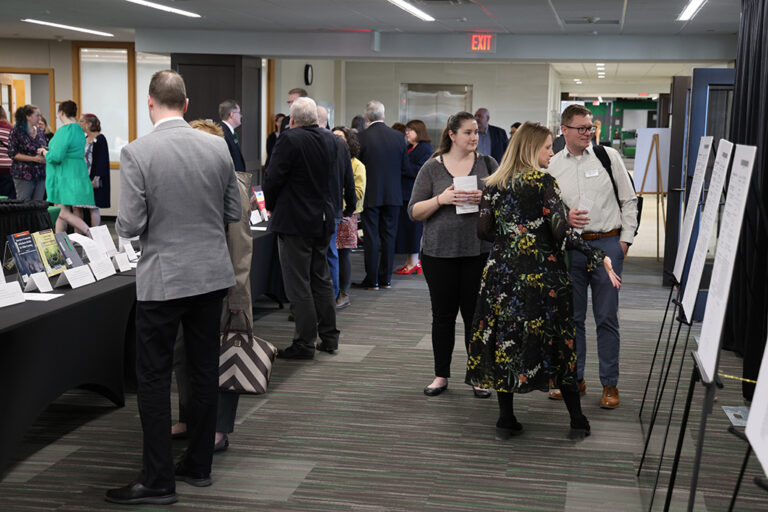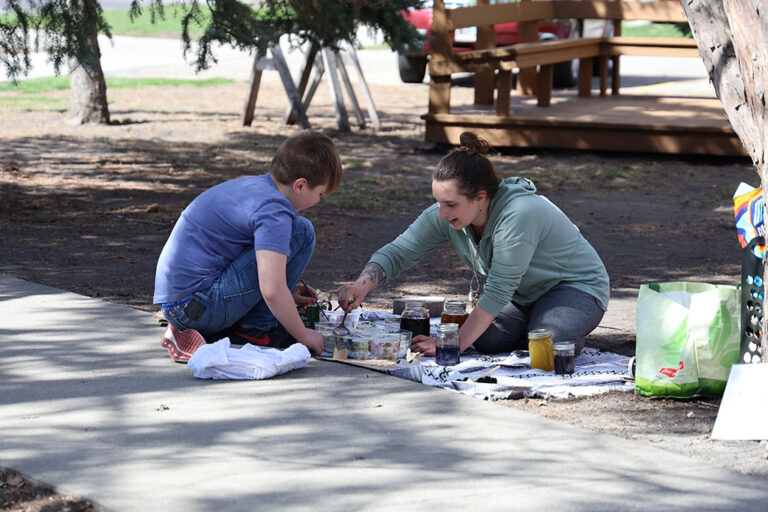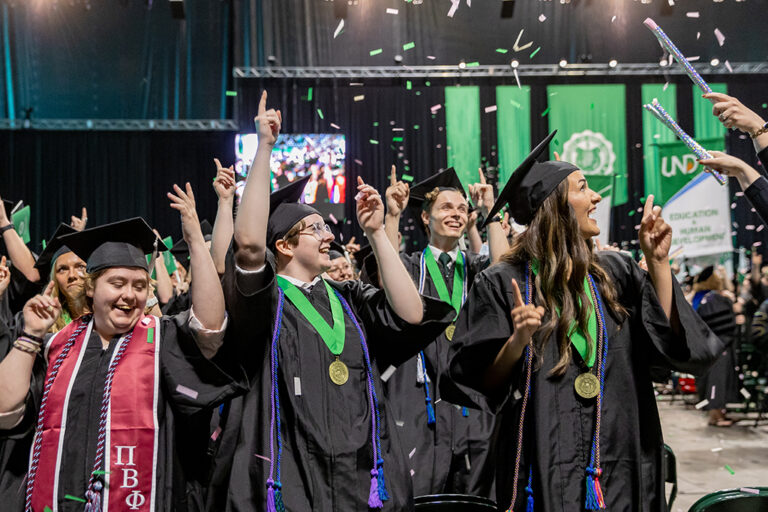‘So key to what I was able to do later’
That’s how Greg Brockman describes North Dakota, where he grew up, graduated from high school and attended UND

Editor’s note: The following conversation has been edited for clarity. Greg Brockman, a Thompson, N.D., native, is the co-founder of OpenAI, the artificial intelligence research company that produced the ChatGPT program.
As a student at Red River High School in Grand Forks, Brockman took classes at UND.
On Tuesday, Sept. 26, Brockman spoke about his career to more than 500 people in the UND Memorial Union. The following transcript is from a one-on-one conversation between Brockman and UND Today, which took place after the public event. An article about Brockman’s appearance at UND can be found on the UND Today website.
****
UND Today: What did growing up in North Dakota mean to you? Could you talk about your experiences here?
Greg Brockman: I thought a lot about how I would have been, if I’d grown up somewhere else. Of course, it’s always hard to know, but I think that for me, there are so many childhood experiences that were just fundamentally tied to being in a rural place. We were on a hobby farm with horses and cows and chickens and the whole thing. I had to bring the hose out in the middle of winter, and then I’d have to bring it back inside rather than leave it out to freeze.
It was hard to hang out with other people. We lived outside of Thompson, so I think I just had a lot of time to explore what I was excited about, and who I wanted to be. One thing that my mother did very well was that she looked at what people were doing outside of North Dakota. I got into math competitions, she found these math camps, and I got interested in chemistry competitions. I just got excited about doing it. I did the International Chemistry Olympiad. I think it was this mix of having the ability to be self-guided and to go into the University of North Dakota.
The funny thing is in Minnesota, in my understanding at least at the time, was they had a standard program. I think starting junior year of high school, you could take one college class a semester. For me, because it was all unstructured and we could come up with something custom, I was able to do as many classes as I wanted at UND, starting my sophomore year of high school. You could just start taking the university classes and expanding your mind in ways that you totally wouldn’t have otherwise.
I think that in North Dakota, the environment, and honestly the people in the community who supported me and my family, that was all so key to what I was able to do later.
UND Today: Your name came to our attention when we learned that you were a participant in the SPA (Summer Performing Arts) program at Red River High School. Can you talk about your recollections there?
GB: I was really into the acting side for a bit. At SPA, one of the things I learned was about improv and about solving problems with other people. The thing I love about improv is just being creative. It’s pure creativity, right? It’s not an individual sport, it’s a team sport. You have to learn how to be like, ‘Oh this person seems to have this thing that they’re thinking about,’ and you can flesh it out and you’re passing the ball back and forth. That was something that I really latched on to, and it’s something that really stuck with me at Red River.
Also, I was in The Best Christmas Pageant Ever. I was Charlie. Again, it’s just like you’re building something together that really stuck with me. I felt like I found a fork in the road, with whether I wanted to go more the creative route or the math/science route, and I ended up wanting to really focus on math. I kind of miss the acting side and that kind of creative expression. I think I found that expression, but through very different mechanisms.
One other thing on the activities front that I had forgotten, is that I started with one of my friends a math club for middle schoolers. That was really cool, because one thing that has also been very important for me is not just doing the work but helping others to do the work. I was excited about math, I did the math competitions, and I wanted other people to do math competitions. That first opportunity of being able to create the math club was important to me and very formative.
UND Today: This question is from a Feb. 3, 2007, interview you did with Doreen Yellow Bird at The Grand Forks Herald. They spoke to you about being a finalist for the Intel Science Talent Search. You told Doreen: “That is the first time that I saw the kind of “Wow!” factor that math could have. When I’m doing a problem, I always look for that “Wow!” factor. It is something that is there. It is something that transcends reality. It is something that’s in math, some kind of object that exists because of logic. That is what really got me interested in math.”
We are guessing you found that “wow factor” in AI. Is that what led you to AI?
GB: Absolutely, yes. The funny thing is the moment when it clicks, where you realize there’s this thing that’s always been, like it’s this platonic ideal and you’re just sort of shaving away at the surface or starting to see it, that was the thing that drove me. That’s why I thought in high school I was going to be a mathematician.
I used to say that I wanted to be working on a 100-year time horizon, that if anyone ever used something that I’d done while I was alive, it wasn’t abstract enough. Then I started programming. I started programming because I wanted to write this chemistry textbook and no one was going to publish it, so I was going to have to make a website. That was the reason.
I remember the very first thing I programmed was this table-sorting widget. You could click a column and it would sort the table. The thing for me was, I had pictured it in my head, and now it existed! That was the ‘wow.’ It was like this amazing thing that was previously in my head in this cognitive space, and suddenly it was there for anyone to use. No one else had to make the connection, it was obvious you just use it.
Then I decided I wanted to do useful things, none of this abstract stuff. I want to do it because I get the ‘wow’ factor. It’s still the same thing that motivates me, but the impact is there, you can actually change people’s lives. AI is the ultimate version of that. Not only can you solve the problem yourself, get the ‘wow’ yourself, but the machine also gets its own ‘wow.’ It solves a problem that you couldn’t, and then you bring that to everyone. That’s something that I just find so beautiful.
UND Today: How do you envision your former neighbors in Thompson or former classmates in Grand Forks will be using AI in five years?
GB: I think everyone is going to be using AI deeply in their lives in five years. People have already started doing it. There are some problems that are unique to North Dakota, I’m sure. Think about farming. Farming has seen some of the earliest adopters of a lot of this computer-vision technology. It’s like making self-driving tractors much easier than a self-driving car. There’s so much labor that you can enhance and just make people more productive.
A lot of what we’re doing is what you’d think of as cognitive tools. People are thinking about where AI will make an impact, and the first place people would think about was not in poetry, writing essays, programming and a lot of these cognitive tasks. Our hope is that people are using AI in their daily lives just like the same way you have a cellphone. You can have an experience like the movie “Her” where the AI is always on and you’re talking to it and getting good advice from it. When you have a hard problem that you’re trying to solve, you have a human team that you’re working with, but you also have an AI. AI has potential for every facet of human life.
UND Today: What sort of tips or advice can you offer current UND students hoping to pursue a tech career?
GB: I think the most important thing is to lean in. Try out all the AI tools that are out there and become experts in them and see where they work where they don’t, and what you can extract from them that no one else can. One of the things that’s really changing as AI tools get better is that mechanical barriers are going down. Handwriting used to be really important, and my handwriting is horrible. Handwriting is not the thing anymore. There are a lot of these things that are not really about how good your idea is, how motivated you are, how much you care about this problem, all those fundamentals. I think that those barriers to entry are going to go away.
With tech, learning to program is an important skill. A lot of people are debating ‘Oh, maybe the AI will just obviate that,’ but programming is not about the typing. Programming is not about arranging the letters. It’s really about the thought, about the thing that I want to exist in the world and how it should work. That’s something that AI will increasingly help with, and I think there’s a deep human component to it. Long term, it’s hard to say what will be possible or exactly what things will look like, but I think there’s so much to build.
It’s funny, there are so many people that have ended up in a tech career that I wouldn’t have thought so from knowing them earlier. Even I didn’t think that I would, but it’s a way to have an impact and express the things that you care about.


